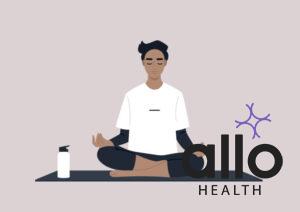How to Control Sexual Desire: Tips and Strategies

Allo Health is dedicated to personalized well-being, offering support and trusted information tailored to individual health goals. The platform emphasizes human-generated content, led by a distinguished medical team of experts, including physicians and sexual health specialists. Their commitment to credibility involves rigorous fact-checking, authoritative research, and continuous updates to ensure accurate, up-to-date information. Allo Health's unique approach goes beyond conventional platforms, providing expert-led insights and a continuous commitment to excellence, with user feedback playing a crucial role in shaping the platform's authoritative voice.

Dr. Aditi completed her undergraduate medical education at AJIMS, Mangalore, after which she worked in multi-speciality hospitals with COVID patients and in the Pain and Palliative medicine department. Driven by her experiences, she developed a keen interest in psychiatry. Dr. Aditi believes that mental health is just as, if not more important, than physical health.
Why This Was Upated?
Our experts continually monitor the health and wellness space, and we update our articles when new information became available.
Updated on 15 June, 2024
- Article was updated as part of our commitment to diversity, equity, and inclusion.

"The following blog article discusses exercise and its potential benefits for general health and well-being. However, it is important to understand that the information provided is for general educational purposes only and should not be considered as personalized exercise advice or a substitute for professional guidance from a qualified fitness professional or healthcare provider. Before starting or modifying any exercise program, it is recommended to consult with a qualified fitness professional.
Book consultation
The information presented in this article may not be suitable for everyone, as individual fitness levels, health conditions, and limitations can vary significantly. A qualified fitness professional can assess your specific fitness needs, consider any medical concerns or limitations, and provide personalized recommendations and exercise plans that are safe and effective for you.
Participating in physical activity, including exercise, carries inherent risks. It is crucial to listen to your body, exercise within your personal limits, and be aware of any signs of discomfort or potential injury. If you experience any pain, dizziness, shortness of breath, or other concerning symptoms during exercise, it is important to stop immediately and seek medical attention if necessary.
The exercises or activities mentioned in this article may not be suitable for individuals with specific medical conditions, injuries, or physical limitations."
Sexual desire is a natural part of being human, and feeling attracted to someone can be an exciting and fulfilling experience. However, when sexual desire becomes uncontrolled, it can lead to negative effects on both your physical and mental health, relationships, and personal life. This article talks about tips and strategies as to how to control sexual desire in a healthy way.
Understanding Sexual Desire

Sexual desire, also referred to as libido or lust, is a complex and multifaceted aspect of human sexuality. It encompasses the feelings, thoughts, and sensations that drive an individual’s interest and motivation for sexual activity. Understanding sexual desire involves exploring its origins, variations, and factors that can influence it.
Origins of Sexual Desire
Sexual desire can stem from a combination of biological, psychological, and social factors. Biologically, hormones such as testosterone play a significant role in stimulating sexual desire in both men and women. Psychological factors, including fantasies, attraction to specific individuals, and personal experiences, also contribute to sexual desire. Additionally, cultural and societal influences, beliefs, and values shape how individuals perceive and express their sexual desires.
Variations in Sexual Desire
Sexual desire can vary greatly among individuals. Some individuals may experience high levels of desire, while others may have a lower or fluctuating level of desire. It is important to recognize that variations in sexual desire are normal and influenced by factors such as age, relationship status, health, stress levels, and life circumstances. It is also common for sexual desire to naturally ebb and flow over time.
Factors Influencing Sexual Desire
Hormonal Factors: Hormonal imbalances or changes, such as those occurring during pregnancy, menopause, or certain medical conditions, can impact sexual desire.
Psychological Factors: Psychological factors, including stress, anxiety, depression, body image issues, past traumas, and relationship dynamics, can influence sexual desire. Emotional connection, intimacy, and communication with a partner also play a role.
Health and Medications: Physical health conditions, chronic pain, fatigue, and certain medications (e.g., antidepressants) can affect sexual desire and function.
Lifestyle Factors: Lifestyle choices such as exercise, nutrition, sleep quality, substance use, and overall self-care can influence sexual desire.
Relationship Factors: Relationship dynamics, satisfaction, and emotional connection with a partner can impact sexual desire. Open communication, trust, and the ability to fulfill each other’s needs and desires play a crucial role.
Uncontrolled Sexual Desires
Uncontrolled sexual desires, also known as compulsive sexual behavior, hypersexuality, or sexual addiction, refer to patterns of behavior where an individual feels a persistent and intense urge to engage in sexual activities, despite negative consequences. Some common characteristics of uncontrolled sexual desires include:
Loss of Control: Individuals with uncontrolled sexual desires often experience a lack of control over their sexual impulses. They may find it difficult to resist engaging in sexual activities or to stop once they have started, even if they want to.
Preoccupation with Sexual Thoughts: There is a persistent preoccupation with sexual thoughts, fantasies, or urges that may intrude upon daily life and interfere with the ability to concentrate or engage in other activities.
Excessive Time and Energy Spent on Sexual Activities: Individuals may spend a significant amount of time and energy seeking out sexual experiences, viewing pornography, or engaging in compulsive sexual behaviors. This can lead to neglecting other important areas of life, such as work, relationships, and personal responsibilities.
Interference with Relationships and Functioning: Uncontrolled sexual desires can strain personal relationships, as individuals may prioritize their sexual behaviors over their partners’ needs or may engage in secretive or risky sexual activities. It can also impact overall functioning, including work performance and emotional well-being.
Failed Attempts to Control or Reduce Sexual Behaviors: Individuals with uncontrolled sexual desires often make unsuccessful attempts to control or reduce their sexual behaviors, leading to feelings of frustration, guilt, and shame.
Negative Consequences: Engaging in compulsive sexual behaviors can result in negative consequences, such as legal issues, financial problems, relationship conflicts, emotional distress, or physical health risks.
It’s important to note that uncontrolled sexual desires are complex and can be influenced by various factors, including underlying psychological, emotional, and biological factors. Seeking professional help from a therapist or healthcare provider specializing in sexual health can provide support, guidance, and appropriate treatment options for individuals struggling with uncontrolled sexual desires.
The Negative Effects of Uncontrolled Sexual Desires
Uncontrolled sexual desires can have several negative effects on individuals and their lives. These effects can impact various areas, including physical, emotional, social, and psychological well-being. Here are some potential negative effects:
Relationship Strain: Uncontrolled sexual desires can strain personal relationships. Individuals may prioritize their sexual behaviors over the needs and emotional well-being of their partners. This can lead to conflicts, trust issues, and feelings of neglect or betrayal.
Emotional Distress: Engaging in compulsive sexual behaviors without being able to control or resist the urges can cause significant emotional distress. Individuals may experience feelings of guilt, shame, or self-disgust, which can lead to low self-esteem, anxiety, or depression.
Risky Sexual Behaviors: Uncontrolled sexual desires may lead to engaging in risky sexual behaviors, such as unprotected sex, multiple sexual partners, or encounters with unknown partners. This can increase the risk of sexually transmitted infections (STIs) or other physical health concerns.
Impact on Mental Health: Uncontrolled sexual desires can contribute to or exacerbate mental health issues, such as obsessive-compulsive disorder (OCD), mood disorders, or substance abuse problems. The constant preoccupation with sexual thoughts and the inability to control behaviors can negatively affect overall mental well-being.
Legal and Financial Consequences: Engaging in certain sexual behaviors without consent or engaging in illegal activities, such as solicitation of sex or possession of child pornography, can lead to legal consequences. Additionally, excessive spending on sexual activities or pornography can result in financial difficulties.
Interference with Daily Life: Uncontrolled sexual desires can interfere with various aspects of daily life, including work, academic performance, and social activities. The preoccupation with sexual thoughts and engagement in compulsive behaviors may lead to a lack of focus, decreased productivity, and social isolation.
Impact on Self-Image and Identity: Individuals with uncontrolled sexual desires may struggle with their self-image and sense of identity. They may feel a loss of control, leading to a negative perception of themselves and difficulty forming healthy, authentic relationships.
Furthermore, uncontrolled sexual desires can also lead to financial problems, as individuals may spend excessive amounts of money on pornography, sex toys, or sex workers. This can lead to debt, financial instability, and even legal issues.
Additionally, uncontrolled sexual urges or desires can negatively impact one’s spiritual and moral values, leading to feelings of guilt, shame, and a loss of personal integrity. It is important to seek help and support if you are struggling with uncontrolled sexual desires, as it can have a significant impact on your overall wellbeing and quality of life.
Importance of Controlling Your Sexual Desires
It is essential to control your sexual desires for the sake of your wellbeing. When you can manage your impulses and urges, you’ll be able to focus on other areas of your life and pursue the goals that matter most to you. Controlling your sexual desires will also help you have more meaningful relationships and enhance your overall well-being.
Moreover, controlling your sexual desires can prevent you from engaging in risky sexual behaviors that can lead to sexually transmitted infections (STIs) and unwanted pregnancies. By practicing safe sex and being mindful of your sexual desires, you can protect yourself and your partner from potential harm.
Additionally, learning to control your sexual desires can also improve your mental health. When you are constantly consumed by sexual thoughts and desires, it can lead to feelings of guilt, shame, and anxiety. By managing these impulses, you can experience a greater sense of self-control and self-esteem, which can positively impact your overall mental health and well-being.
Strategies for Managing Your Sexual Desires
Managing sexual desires is an important aspect of maintaining a healthy and balanced approach to sexuality. Here are some strategies that can help you effectively manage your sexual desires:
Self-Awareness: Develop self-awareness regarding your sexual desires, triggers, and patterns. Pay attention to what arouses you and how you respond to those stimuli. Understanding your desires can help you make informed decisions and navigate them in a healthy manner.
Communication: Open and honest communication with your partner(s) is crucial. Discuss your desires, boundaries, and expectations. It allows for mutual understanding, consent, and the opportunity to explore shared interests. Effective communication can lead to a more satisfying and fulfilling sexual experience.
Establish Boundaries: Set personal boundaries that align with your values, beliefs, and comfort levels. Determine what activities or situations are off-limits for you and communicate them clearly to your partner(s). Respecting and honoring your boundaries is essential for maintaining a healthy sexual dynamic.
Practice Delayed Gratification: Engaging in sexual activities impulsively can sometimes lead to negative consequences. Practice delayed gratification by taking the time to assess your desires, evaluate the situation, and make conscious decisions rather than acting on immediate impulses.
Explore Alternative Outlets: Find healthy and non-sexual outlets for your sexual energy. Engage in physical activities, creative pursuits, or hobbies that allow you to channel your energy in productive ways. Regular exercise, meditation, or mindfulness practices can also help manage sexual desires.
Focus on Intimacy: Prioritize emotional intimacy and connection with your partner(s). By focusing on building and nurturing emotional bonds, you can strengthen the overall relationship and create a deeper sense of satisfaction. Intimacy can help fulfill the emotional aspects of sexual desires.
Manage Stress: High levels of stress can amplify sexual desires and make it more challenging to manage them effectively. Find healthy ways to manage stress, such as practicing relaxation techniques, seeking support from loved ones, or engaging in stress-reducing activities like exercise or hobbies.
It is important to note that managing sexual desires is a personal journey and what works for one person may not work for another. It is also important to understand that having sexual desires is a natural and healthy part of being human.
However, if your sexual desires are causing distress or interfering with your daily life, seeking professional help may be beneficial. Remember, there is no shame in seeking help and taking care of your mental and emotional well-being.
Techniques for Reducing Sexual Tension
Reducing sexual tension can be helpful in situations where it is important to manage sexual desires or redirect focus to other areas of life. Here are some techniques that can assist in reducing sexual tension:
Physical Activity: Engaging in regular physical activity can help redirect sexual energy and reduce sexual tension. Exercise releases endorphins, promotes overall well-being, and can help distract the mind from sexual thoughts. Activities such as running, dancing, or practicing yoga can be particularly beneficial.
Relaxation Techniques: Employ relaxation techniques to calm the mind and body. Techniques such as deep breathing, progressive muscle relaxation, meditation, or mindfulness can help reduce stress and redirect focus away from sexual tension.
Engage in Hobbies and Distractions: Find activities or hobbies that captivate your attention and provide a sense of fulfillment. Immersing yourself in creative pursuits, hobbies, or challenging tasks can divert your focus from sexual thoughts and help reduce sexual tension.
Socializing and Connection: Spending time with friends or loved ones can help shift your focus away from sexual tension. Engaging in social activities, meaningful conversations, or participating in group events can provide a sense of connection and reduce feelings of sexual tension.
Self-Care: Prioritize self-care activities to nurture your overall well-being. Take time to engage in activities that promote relaxation, such as taking a warm bath, reading a book, listening to music, or practicing self-compassion. Taking care of yourself holistically can help reduce sexual tension.
Cognitive Reframing: Use cognitive reframing techniques to change the way you think about and perceive sexual tension. Challenge any negative or intrusive thoughts associated with sexual tension and replace them with more positive or neutral thoughts. Redirect your focus towards more constructive or meaningful aspects of life.
Time Management: Effective time management can help reduce sexual tension by keeping your mind engaged and occupied. Prioritize tasks and set achievable goals to maintain a sense of purpose and accomplishment. Structure your day in a way that allows for a healthy balance between work, leisure, and personal activities.
Seek Support: If you find it challenging to reduce sexual tension on your own, consider seeking support from a healthcare professional or therapist specializing in sexual health. They can provide guidance, strategies, and interventions to help manage and redirect sexual tension effectively.
Remember that everyone’s experience with sexual tension is different, and it may require some experimentation to find what works best for you. It is essential to approach sexual tension with self-compassion and a non-judgmental attitude.
How to Identify and Avoid Triggers that Increase Your Sexual Desires
Identifying and avoiding triggers that increase your sexual arousal or desires can help you manage your impulses more effectively. Some common triggers include stress, anxiety, and exposure to sexual images or pornographic materials. Once you’ve identified your triggers, work to avoid or reduce your exposure to them as much as possible.
It’s important to note that triggers can vary from person to person. For some, certain scents or sounds may increase their sexual desires, while for others, it may be certain types of clothing or physical touch. It’s important to pay attention to your own triggers and take steps to avoid or manage them. This may include practicing relaxation techniques, seeking therapy, or finding alternative activities to engage in when you feel triggered.
Meditation Techniques for Managing Your Libido

Meditation can be a valuable practice for managing your libido and promoting a sense of balance and self-control. While meditation cannot eliminate sexual desires entirely, it can help cultivate mindfulness, awareness, and a better understanding of your impulses. Here are some meditation techniques that can assist in managing your libido:
Mindful Awareness: Practice mindfulness meditation by focusing your attention on the present moment without judgment. Observe any sexual thoughts, desires, or sensations that arise without getting caught up in them. Develop a non-reactive stance towards these experiences, allowing them to come and go without indulging or suppressing them.
Breath Awareness: Use the breath as an anchor for your meditation practice. Focus your attention on the sensation of the breath entering and leaving your body. When sexual thoughts or desires arise, gently redirect your focus back to the breath, allowing the thoughts to pass without attachment or judgment.
Body Scan Meditation: Engage in a body scan meditation where you systematically bring attention to different parts of your body. By becoming aware of bodily sensations, including any sexual sensations, you can observe them without immediately acting on them. This practice promotes a deeper connection with your body and enhances self-awareness.
Loving-Kindness Meditation: Cultivate compassion and loving-kindness towards yourself and others through loving-kindness meditation. By generating feelings of love, acceptance, and goodwill, you can create a positive mindset that allows you to relate to your sexual desires with greater understanding and self-compassion.
Visualization Techniques: Engage in visualization exercises that help redirect sexual energy towards other areas of life. Visualize yourself engaging in fulfilling activities or pursuing meaningful goals that align with your values. By directing your attention and energy towards these positive images, you can create a sense of balance and reduce the intensity of sexual desires.
Non-Attachment: Practice non-attachment by observing your sexual thoughts and desires without identifying with them or feeling the need to act upon them. Recognize that thoughts and desires are transient and do not define your identity or worth. Embrace the impermanence of these experiences, allowing them to arise and pass without clinging to or resisting them.
Cultivating Concentration: Engage in concentration-based meditation practices, such as focusing on a single object or mantra. By developing concentration skills, you can enhance your ability to redirect your attention away from sexual thoughts and maintain focus on your chosen object of meditation.
Remember, meditation is a practice that requires patience, consistency, and self-compassion. It may not completely eliminate sexual desires, but it can help you develop greater self-awareness, emotional regulation, and the ability to make conscious choices regarding your sexual impulses. It is essential to approach meditation with an open mind and without judgment, allowing yourself to explore and learn from the experience.
How to Communicate with Your Partner About Your Sexual Desires
Open and effective communication with your partner about your sexual desires is crucial for fostering a healthy and satisfying sexual relationship. Here are some steps to help you communicate with your partner about your sexual desires:
Self-Reflection: Take time to reflect on your own sexual desires and preferences. Understand what turns you on, what you enjoy, and what you would like to explore or try with your partner. This self-reflection will help you articulate your desires more effectively.
Choose the Right Time and Place: Find a comfortable and private setting where you can have an open and uninterrupted conversation. Avoid discussing sexual desires in the heat of the moment or when either of you is feeling stressed or distracted.
Be Clear and Direct: When expressing your desires, be clear and specific in your communication. Use “I” statements to express your own needs and desires, rather than placing blame or making assumptions about your partner. For example, say, “I would love to try…,” or “I enjoy it when you…”
Active Listening: Encourage your partner to share their desires as well. Practice active listening by giving your full attention, maintaining eye contact, and responding with empathy and understanding. Be open-minded and non-judgmental, allowing your partner to express themselves freely.
Respect Boundaries: Remember that everyone has different comfort levels and boundaries when it comes to sexual desires. Respect your partner’s boundaries and be willing to compromise or negotiate if there are areas where your desires may differ. Mutual consent and respect are key.
Create a Safe Space: Foster an environment of trust and safety where both you and your partner feel comfortable expressing your desires without fear of judgment or rejection. Encourage open and honest communication by being supportive, understanding, and non-critical.
Ask for Feedback: Encourage your partner to share their thoughts, feelings, and desires as well. Ask for feedback and actively listen to their responses. This creates a reciprocal and collaborative dynamic, where both partners’ desires are valued and respected.
Practice Consent: Throughout the conversation, emphasize the importance of consent. Make it clear that both partners have the right to say “no” or express discomfort at any point. Consent should be enthusiastic, ongoing, and freely given.
Explore Together: Consider exploring your desires together as a couple. Discuss ways to incorporate each other’s desires into your sexual experiences, and be open to trying new things that both partners feel comfortable with. This shared exploration can deepen intimacy and create a stronger connection.
Remember, effective communication requires practice and patience. It’s important to create an atmosphere of trust and non-judgment, allowing both partners to express themselves freely. By communicating openly about your sexual desires, you can strengthen your connection, enhance sexual satisfaction, and foster a more fulfilling and intimate relationship.
Overcoming Shame and Guilt Related to Your Sexual Desires
Many individuals feel shame and guilt about their sexual desires, particularly if they are unconventional or taboo. However, it is important to realize that everyone has unique desires, and there is no “right” way to explore your sexuality. Seek support from a therapist or support group if you’re struggling with feelings of shame or guilt related to your desires.
It’s also important to understand that shame and guilt related to sexual desires can stem from societal and cultural norms that dictate what is considered “normal” or “acceptable” in terms of sexuality. These norms can be limiting and harmful, and it’s important to challenge them and embrace your own unique desires.
Additionally, exploring your sexuality in a safe and consensual manner can actually lead to increased self-awareness, self-esteem, and overall well-being. Don’t let shame and guilt hold you back from experiencing pleasure and intimacy in a way that feels authentic to you.
Frequently Answered Questions
Q: Is it possible to completely eliminate sexual desires?
A: Completely eliminating sexual desires is unlikely and not necessarily desirable. Sexual desires are a natural part of human sexuality. However, it is important to manage and express them in a way that is respectful, consensual, and aligned with personal values and boundaries.
Q: Are there any negative consequences of uncontrolled sexual desires?
A: Uncontrolled sexual desires can lead to various negative consequences. Engaging in non-consensual or coercive behaviors, violating boundaries, causing harm to oneself or others, and legal or ethical issues are some of the potential negative consequences. It is important to exercise control over sexual desires to prioritize consent, respect, and the well-being of all parties involved.
Q: How can I strike a balance between embracing my sexual desires and controlling them?
A: Striking a balance between embracing and controlling sexual desires involves self-awareness, communication, and self-discipline. It is about understanding and accepting your desires while also considering the needs, boundaries, and well-being of yourself and your partner(s). Open and honest communication, consent, and mutual respect are key components in finding a healthy and balanced approach to managing and expressing sexual desires.
Q: How can I differentiate between healthy sexual desires and problematic behaviors?
A: Differentiating between healthy sexual desires and problematic behaviors can be complex. Healthy sexual desires involve consensual, respectful, and mutually satisfying interactions that align with personal values and boundaries. Problematic behaviors, on the other hand, may involve non-consensual acts, crossing boundaries, causing harm to oneself or others, or interfering with daily life functioning.
Q: Can suppressing or repressing sexual desires have negative effects?
A: Suppressing or repressing sexual desires can potentially have negative effects. Repression can lead to feelings of guilt, shame, or frustration, and may contribute to emotional and psychological distress. It is important to find a healthy balance between managing and expressing sexual desires, taking into consideration personal values, boundaries, and the well-being of oneself and others.
Q: How can I navigate differences in sexual desires between me and my partner?
A: Navigating differences in sexual desires requires open and honest communication, respect, and a willingness to compromise. Engage in non-judgmental discussions with your partner, actively listen to their desires, and express your own desires and boundaries. Seek common ground, explore new experiences, or find alternative ways to meet each other’s needs. If necessary, consider seeking guidance from a professional, such as a sex therapist, who can assist in navigating these differences and finding mutually satisfying solutions.
Learning how to control sexual desires is a personal journey that requires self-awareness, self-discipline, and open communication. It is important to recognize that sexual desires are a natural part of human sexuality, and the goal is not to eliminate them completely, but rather to manage and express them in a way that is respectful, consensual, and aligned with personal values and boundaries.
By developing self-control techniques, seeking support when needed, and engaging in open and honest conversations with partners, individuals can navigate their desires in a healthy and fulfilling manner and foster healthy romantic relationships. . Remember, controlling sexual desires is a continuous process that requires patience, self-compassion, and a commitment to personal growth and well-being.






































